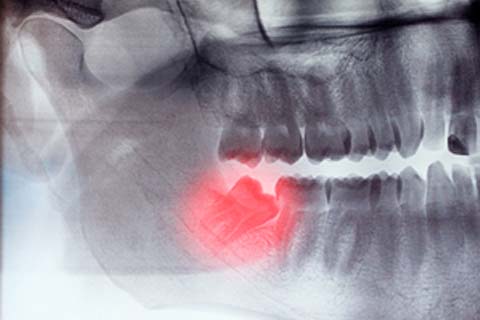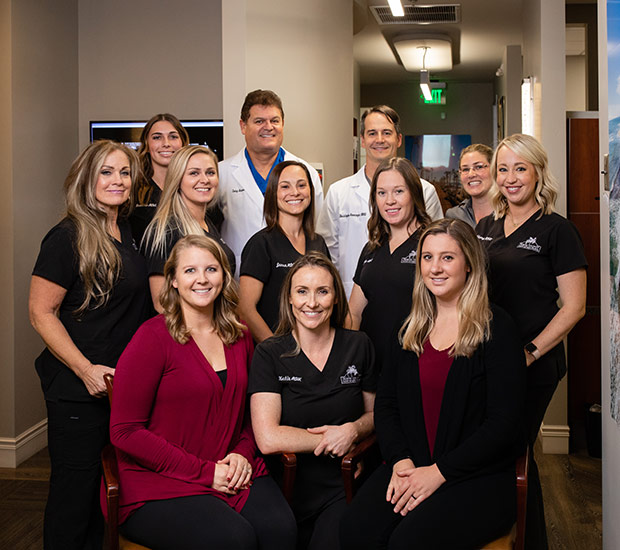
The removal of wisdom teeth has become so common that it seems like a right of passage. In fact, they are called “wisdom” teeth because they begin erupting as we enter adulthood. Wisdom teeth, also referred to as third molars, are one of those odd twists in human evolution where an obsolete body part continues to develop in each new generation — a vestigial organ like the appendix or coccyx. Our early ancestors once had wider jaws and required an additional set of teeth to help them chew a rough diet of seeds, nuts, roots, and plants.
Over time, humans have developed tools and cooking methods that make eating much easier, in addition to an expanded diet of accessible foods that don’t require grinding to break down. Parts of our bodies did adapt to this new way of living, allowing our jaws to slim down because we no longer needed the strength of a massive jaw. Unfortunately, the wisdom teeth that once fit perfectly in our larger mouths did not go away, leaving us with the consequences.
If you (or your child) has not yet had wisdom teeth removed, you may be wondering if it is absolutely necessary. The answer is... is depends. For some people, leaving in wisdom teeth is perfectly fine, and for others, removing wisdom teeth will be in their best interest. Read on to learn about 3 reasons why extraction may be necessary, and 3 reasons or situations when leaving the teeth is okay.
3 Common Reasons to Remove Your Wisdom Teeth
1. Your Wisdom Teeth Are Impacted
If your wisdom teeth cannot break through the surface of the gum or get stuck halfway through eruption, they become impacted. Impaction can be an incredibly painful condition that makes it difficult to eat, drink, swallow or care for your teeth. The pain radiates throughout the mouth and jaw as the problem persists, causing extreme distress for the sufferer.
Impacted wisdom teeth cause damage to your neighboring teeth and put you at risk of infection. Some patients even form cysts in response to the tooth, which can damage your jawbone and cause harm to the roots of surrounding teeth. Patients often choose early extraction to avoid this potential issue even if they do not feel pain immediately.
2. The Erupted Teeth Are Difficult to Clean
There are times when third molars can erupt without crowding the jaw or causing pain to the patient. However, the addition of those teeth can create issues with your dental hygiene. Just because your jaw is large enough to accommodate your new teeth does not mean the oral cavity (your mouth in total) is large enough to allow you access to clean them.
If you have ever struggled to manage cleaning your second molars, your wisdom teeth will not improve your experience. If you are unable to properly brush and floss your new teeth, you dramatically increase your risk of gum disease. If your hygienist has difficulty cleaning the teeth because they are only partially erupted through the gum (impacted), that can also put you at risk of tooth decay, gum disease and infection.
3. Your Sinuses Are Suffering
Sinus pressure is one of the rarer side effects that occur when the third molars come in. However, it is still a painful problem that needs to be solved when it occurs. As with most wisdom teeth side effects, sinus pressure occurs because there simply is not enough room. Crowding can create intense pressure on the sinuses, leading to pain, congestion, swelling and headaches.
If your third molars become infected, the roots of those teeth are located right next to your sinus cavities, making them great infection transporters. Removal takes the pressure off of your sinuses and removes a vector for infection at the same time. Patients report positive results after they have recovered from surgery.
Three Reasons Not to Extract Your Wisdom Teeth
There are some instances where removal is unnecessary. While most of you might be reflecting on your own experience with painful eruptions and crowding and wondering how that is possible, some people do go through life without extraction.
1. You Are Not Experiencing Any Pain
Pain is typically the first sign that your wisdom teeth are emerging incorrectly or have become impacted. If your X-rays show a normal, healthy progression and you are not experiencing any pain, you may not need an extraction. However, it is important to note how important the "normal, healthy progression" part of the equation is when it comes to making a final decision regarding extraction.
2. Your Wisdom Teeth Are in the Correct Position
In addition to the ability to care for your new molars, they must also be fully erupted and positioned properly in the mouth to avoid crowding or damaging your other teeth. If your jaw has the room for the teeth to fully erupt without pushing your other teeth from their proper position, you may be able to forgo surgery and have your dentist monitor your bite over time.
3. You Can Clean Your Wisdom Teeth Properly
If your wisdom teeth come in completely and you have the room you need to floss and brush them, there is really no need to remove them. They are performing as the third molars they were intended to be and you are blessed with a little extra chewing power. It is really important that you get the recommendation of a dentist before making the decision not to extract. They can determine if you are cleaning appropriately and that your hygienist can access them during regular cleanings.
Deciding when or if to extract your wisdom teeth is an important decision! If you have more questions or concerns about your wisdom teeth, North County Cosmetic and Implant Dentistry can help answer your toughest questions. Call today to schedule an appointment so we can take a look at your specific situation and make a plan for your best oral health.
Oral Health for Overall Health in 2023
If you’re entering 2023 with a renewed focus on your health, be sure to incorporate a renewed focus on your dental health. It’s not just about having a great smile, it’s about having a great life!
North County Cosmetic and Implant Dentistry can help you establish your goals, treat existing issues and get you on the road to a healthier you.
Call us today at 760-940-2273 to schedule an appointment.
Recent Posts
Maintaining good oral health is essential for overall well-being. One of the key professionals who play a vital role in ensuring optimal oral health is the Registered Dental Hygienist (RDH). Let’s explore how regular visits to your RDH contribute to your overall health while giving you a healthy smile.The term “Certified Dental Hygienist” is actually…
Preventative dental care is essential for maintaining good dental health. Regular check-ups with a dentist can help identify and address potential dental issues before they become more serious. North County Cosmetic and Implant Dentistry in Vista, CA offers a range of preventative dental services to help patients achieve and maintain healthy teeth and gums.One of…
Among the most common dental problems that a general dentist treats are cavities. Most people will experience this form of tooth decay at some point due to:Dry mouthSugary foods and drinksPoor oral hygieneGeneticsThere are several types of cavities, and each can lead to complications without prompt treatment.A general dentist first considers a cavity's location when…







